Chancellor of Germany
| Chancellor of Germany | |
 Coat of arms of the German Government |
|
| Inaugural holder | Otto von Bismarck |
|---|---|
| Formation | 21 March 1871 |
| Website | www.bundeskanzlerin.de |
The head of government of Germany is called Chancellor (German: Kanzler). In German politics the position is equivalent to that of a Prime Minister in other countries. The latter term is not used, since its direct German equivalent, Ministerpräsident, is used exclusively for the heads of government of the states of Germany (called Bundesländer in German).
The office of Chancellor has a long history, stemming back to the Holy Roman Empire. The title was at times used in several states of German-speaking Europe. The modern office of Chancellor was established with the North German Confederation, of which Otto von Bismarck became Chancellor (German, Bundeskanzler) in 1867. After unification of Germany in 1871, the office became known in German as Reichskanzler, although it continued to be referred to as Chancellor in English. With Germany's constitution of 1949, the title Bundeskanzler was revived in German.
The current Chancellor of Germany is Angela Merkel, who was elected in 2005. She is the first female Chancellor. In German she is thus known as Bundeskanzlerin. That word was never used officially before Angela Merkel, but it is a grammatically regular formation of a noun denoting a female.
Contents[hide] |
History of position
| Germany |
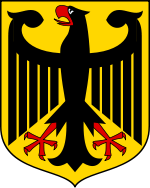 This article is part of the series: |
|
|
|
Other countries · Atlas |
Due to his administrative tasks, the head of the chapel of the imperial palace during the Holy Roman Empire was called Chancellor. The Archbishop of Mainz was German Chancellor until the end of the Holy Roman Empire in 1806 while the Archbishop of Cologne was Chancellor of Italy and the Archbishop of Trier of Burgundy. These three Archbishops were also Prince-electors of the empire. Already in medieval times the Chancellor had political power like Willigis of Mainz (Archchancellor 975–1011, regent for Otto III 991–994) or Rainald von Dassel (Chancellor 1156–1162 and 1166–1167) under Frederick I.
From 1867 to 1871 the title Bundeskanzler (federal chancellor) was used in the German language, during the time of the North German Confederation. From 1871 to 1945, the office was named Reichskanzler (literally, Chancellor of the Realm). Since 1949 the formal title of the office in the German language is once again Bundeskanzler.
In the now defunct German Democratic Republic (GDR, East Germany), which existed from 7 October 1949 to 3 October 1990 (when the territory of the former GDR was reunified with the Federal Republic of Germany), the position of Chancellor did not exist. The equivalent position was called either Minister President (Ministerpräsident) or Chairman of the Council of Ministers of the GDR (Vorsitzender des Ministerrats der DDR). (See Leaders of East Germany.)
Style of address
The correct style of address in German is Herr Bundeskanzler or Frau Bundeskanzlerin. When the office was called Reichskanzler, the official incumbent of the office was to be addressed as "Herr Reichskanzler". This also applied to former chancellors. When addressing former Chancellor Helmut Kohl, the current Chancellor Angela Merkel used the style "Werter Herr Bundeskanzler" (Esteemed Mr Federal Chancellor).
- See the article Chancellor for the etymology of the word.
Bundeskanzler (North German Confederation 1867–1871)
The head of the federal government of the North German Confederation, which was created in 1867, had the title Bundeskanzler. The position was held by the Prussian Minister-President Otto von Bismarck, until German unification under the German Empire in 1871.
Reichskanzler (1871–1945)
- For a detailed discussion of the English translation of Reich, see Reich.
Before World War II, the title in Germany was Reichskanzler . In the 1871 German Empire, the Chancellor served both as the Emperor's first minister, and as presiding officer of the Bundesrat, the upper chamber of the German parliament. He was neither elected by nor responsible to Parliament (the Reichstag). Instead, the Chancellor was appointed by the Emperor.
This was only changed on 29 October 1918, with an amendment to the 1871 constitution. However, the change could not prevent the outbreak of the revolution a few days later. The new constitution of the 1919 Weimar Republic said that the Chancellor was appointed by the German President, but that the parliament had the right to dismiss a chancellor or any of the ministers. Under the Weimar Republic, the Chancellor was a fairly weak figure, serving as little more than a chairman. Cabinet decisions were made by majority vote. In fact many of the Weimar governments depended highly on the cooperation of the President, due to the difficulty of finding a majority in Parliament.
Chancellors of the German Empire (1871–1919)
| Name | Took Office | Left Office | Party | |
|---|---|---|---|---|
| 1 | Prince Otto von Bismarck | 21 March 1871 | 20 March 1890 | |
| 2 | Count Leo von Caprivi | 20 March 1890 | 26 October 1894 | |
| 3 | Prince Chlodwig zu Hohenlohe-Schillingsfürst | 29 October 1894 | 17 October 1900 | |
| 4 | Prince Bernhard von Bülow | 17 October 1900 | 14 July 1909 | |
| 5 | Theobald von Bethmann Hollweg | 14 July 1909 | 13 July 1917 | |
| 6 | Georg Michaelis | 14 July 1917 | 1 November 1917 | |
| 7 | Count Georg von Hertling | 1 November 1917 | 30 September 1918 | |
| 8 | Prince Maximilian of Baden | 3 October 1918 | 9 November 1918 | |
| 9 | Friedrich Ebert | 9 November 1918 | 11 February 1919 | Social Democrats |
Revolutionary period 1918/19
On 9 November 1918, Chancellor Max von Baden handed over his office to Friedrich Ebert. Ebert continued to serve as Head of Government during the three months between the end of the German Empire in November 1918 and the first gathering of the National Assembly in February 1919, but did not use the title of Chancellor.
During that time, Ebert also served as Chairman of the Council of the People's Delegates, until 29 December 1918 together with the Independent Social Democrat Hugo Haase.
Chancellors of the Weimar Republic (1919–1933)
| Name | Took Office | Left Office | Days in office | Party | |
|---|---|---|---|---|---|
| 1 | Philipp Scheidemann (Reichsministerpräsident) | 13 February 1919 | 20 June 1919 | 127 | Social Democrats |
| 2 | Gustav Bauer (Reichskanzler since 14 August) | 21 June 1919 | 26 March 1920 | 279 | Social Democrats |
| 3 | Hermann Müller (1st term) | 27 March 1920 | 8 June 1920 | 73 | Social Democrats |
| 4 | Konstantin Fehrenbach | 25 June 1920 | 4 May 1921 | 313 | Centre |
| 5 | Joseph Wirth | 10 May 1921 | 14 November 1922 | 553 | Centre |
| 6 | Wilhelm Cuno | 22 November 1922 | 12 August 1923 | 263 | |
| 7 | Gustav Stresemann | 13 August 1923 | 30 November 1923 | 109 | German People's Party |
| 8 | Wilhelm Marx (1st term) | 30 November 1923 | 15 January 1925 | 412 | Centre |
| 9 | Hans Luther | 15 January 1925 | 12 May 1926 | 482 | |
| 10 | Wilhelm Marx (2nd term) | 17 May 1926 | 12 June 1928 | 757 | Centre |
| 11 | Hermann Müller (2nd term) | 28 June 1928 | 27 March 1930 | 637 | Social Democrats |
| 12 | Heinrich Brüning | 30 March 1930 | 30 May 1932 | 792 | Centre |
| 13 | Franz von Papen | 1 June 1932 | 17 November 1932 | 169 | |
| 14 | Kurt von Schleicher | 2 December 1932 | 28 January 1933 | 57 |
Chancellors of the Third Reich (1933–1945)
Adolf Hitler became Chancellor of Germany in 1933, a point which historians agree marks the beginning of the Third Reich. Upon taking office Hitler immediately began to accumulate power and changing the nature of the Chancery. After only two months in office the Reichstag passed the Enabling Act which gave the Office of Chancellor full executive powers for a period of four years- the Chancellor could introduce any law without consulting parliament. However, the Chancellorship grew greater still in August 1934 when the incumbent President Paul von Hindenburg died. Hitler used the enabling act to merge the office of Chancellor with that of President to create a new office- Führer, although the offices were merged Hitler continued to be addressed as "Führer und Reichskanzler" indicating that the Head of State and Head of Government were still separate positions albeit held by the same man. This separation was made more evident when in April 1945 Hitler gave instruction that upon his death the office of Führer would dissolve and there would be a new President and Chancellor. On 30 April 1945 Hitler committed suicide and was succeeded as Chancellor by Joseph Goebbels, as dictated in Hitler's Last Will and Testament.
| Name | Took Office | Left Office | Party | |
|---|---|---|---|---|
| 1 | Adolf Hitler ("Führer (leader) and Reich Chancellor" from 1934) | 30 January 1933 | 30 April 1945 | National Socialists |
| 2 | Joseph Goebbels (appointed by Hitler) | 30 April 1945 | 1 May 1945 | National Socialists |
| 3 | Lutz Graf Schwerin von Krosigk (Leading Minister of the Flensburg government) | 2 May 1945 | 8 May, or 23 May, or 5 June 1945 |
None |
Bundeskanzler of the Federal Republic of Germany (since 1949)
West Germany's 1949 constitution, the Basic Law (Grundgesetz), invests the Federal Chancellor (Bundeskanzler) with central executive authority. For that reason, some observers refer to the German political system as a "chancellor democracy". The major party (CDU/CSU or SPD) who does not hold chancellorship, usually calls their leading candidate for the federal election "chancellor-candidate" (Kanzlerkandidat). The Federal Government (Bundesregierung) consists of the chancellor and his or her cabinet ministers.
The chancellor's authority emanates from the provisions of the Basic Law and from his or her status as leader of the party (or coalition of parties) holding a majority of seats in the Bundestag (federal parliament). With the exception of Helmut Schmidt, the chancellor has usually also been chairman of his or her own party. This was the case with Chancellor Gerhard Schröder from 1999 until he resigned the chairmanship of the SPD in 2004.
The German post-war chancellors were officially addressed as "Herr Bundeskanzler", however Angela Merkel is officially addressed as "Frau Bundeskanzlerin", the female form of the title. Use of the mixed form "Frau Bundeskanzler" was deprecated by the government in 2004 because it is regarded as impolite.[1]
Appointment mechanism

Every four years, after national elections and the convocation of the newly elected members of the Bundestag, the chancellor is elected by a majority of the members of the Bundestag upon the proposal of the President (Bundespräsident). This vote is one of the few cases where a majority of all elected members of the Bundestag must be achieved, as opposed to a mere majority of those that are currently assembled. This is referred to as the Kanzlermehrheit (chancellor's majority), and is designed to ensure the establishment of a stable government. It has in the past occasionally forced ill or pregnant members to have to attend parliament when a party's majority was only slim.
Unlike regular voting by the Bundestag, the vote to elect the chancellor is by secret ballot. This is intended to ensure that the chancellor's majority does not depend on members of his party only outwardly showing support.
If the nominee of the President is not elected, the Bundestag may elect its own nominee within fourteen days. If no-one is elected within this period, the Bundestag will attempt an election. If the person with the highest number of votes has a majority, the President must appoint him or her. If the person with the highest number of votes does not have a majority, the President may either appoint them or call new elections for the Bundestag. As all chancellors have been elected in the first vote as yet (1949-2008) neither of these constitutional provisions has been applied.
The chancellor is the only member of the federal government elected by the Bundestag. The other cabinet ministers are chosen by the chancellor himself or herself, although they are formally appointed by the President on the chancellor's proposal.
Votes of no-confidence
- For more details, see Constructive Vote of No Confidence.
Unlike in other parliamentary legislatures, the Bundestag cannot remove the chancellor simply with a Motion of No Confidence. Instead, the early removal of a chancellor is only possible when it simultaneously agrees on a successor. In order to garner legislative support in the Bundestag, the chancellor can also call for a regular Motion of Confidence, either combined with a legislative proposal or as a standalone vote. Only if such a vote fails may the President dissolve the Bundestag.
This procedure exists to avoid the situation that existed in the Weimar Republic, when votes of no-confidence were over-used or abused by parties.
The chancellor's role
The chancellor determines the composition of the Federal Cabinet. The President formally appoints and dismisses cabinet ministers, at the recommendation of the chancellor; no parliamentary approval is needed. According to the Basic Law, the chancellor may set the number of cabinet ministers and dictate their specific duties. Chancellor Ludwig Erhard had the largest cabinet, with twenty-two ministers in the mid-1960s. Helmut Kohl presided over 17 ministers at the start of his fourth term in 1994; the 2002 cabinet, the second of Chancellor Gerhard Schröder, had 13 ministers and the Angela Merkel cabinet as of 22 November 2005 has 15.
Article 65 of the Basic Law sets forth three principles that define how the executive branch functions:
- The "chancellor principle" makes the chancellor responsible for all government policies. Any formal policy guidelines issued by the chancellor are legally binding directives that cabinet ministers must implement. Cabinet ministers are expected to introduce specific policies at the ministerial level that reflect the chancellor's broader guidelines.
- The "principle of ministerial autonomy" entrusts each minister with the freedom to supervise departmental operations and prepare legislative proposals without cabinet interference so long as the minister's policies are consistent with the chancellor's broader guidelines.
- The "cabinet principle" calls for disagreements between federal ministers over jurisdictional or budgetary matters to be settled by the cabinet.
Living ex-chancellors
List of Chancellors since 1949
| # | Picture | Name | Took Office | Left Office | Political Party |
|---|---|---|---|---|---|
| 1. | 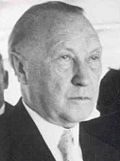 |
Konrad Adenauer | 15 September 1949 | 16 October 1963 | Christian Democrats |
| 2. | Ludwig Erhard | 16 October 1963 | 1 December 1966 | Christian Democrats | |
| 3. | 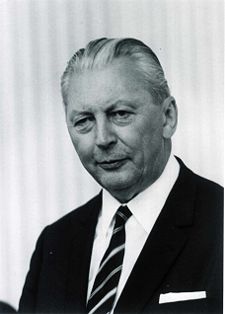 |
Kurt Georg Kiesinger | 1 December 1966 | 21 October 1969 | Christian Democrats |
| 4. |  |
Willy Brandt | 21 October 1969 | 7 May 1974 | Social Democrats |
 |
Walter Scheel1 | 7 May 1974 | 16 May 1974 | Free Democrats | |
| 5. | Helmut Schmidt | 16 May 1974 | 1 October 1982 | Social Democrats | |
| 6. | 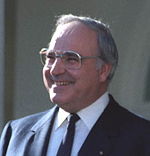 |
Helmut Kohl | 1 October 1982 | 27 October 1998 | Christian Democrats |
| 7. |  |
Gerhard Schröder | 27 October 1998 | 22 November 2005 | Social Democrats |
| 8. | 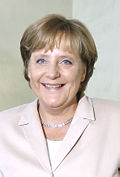 |
Angela Merkel | 22 November 2005 | Present | Christian Democrats |
1: Willy Brandt requested the Federal President to not appoint him as acting chancellor after his resignation, thus the vice chancellor (Walter Scheel) was acting chancellor until Helmut Schmidt's election.
Salary
Holding the third-highest state office available within the Federal Republic of Germany, the Chancellor of Germany receives 220,000 Euro per annum and a 22,000 Euro bonus, i.e. one and two thirds of Salary Grade B11 (according to § 11 (1) a of the Federal Law on Ministres – Bundesministergesetz, BGBl. 1971 I p. 1166 and attachment IV to the Federal Law on Salaries of Officers – Bundesbesoldungsgesetz, BGBl. 2002 I p. 3020).
See also
- Politics of Germany
- History of Germany
- President of Germany
- Leaders of East Germany
- List of Chancellors of Germany
- List of German Chancellors by longevity
- List of state leaders
References
Further reading
Books
- Klein, Herbert, ed. 1993. The German Chancellors. Berlin: Edition.
- Padgett, Stephen, ed. 1994. The Development of the German Chancellorship: Adenauer to Kohl. London: Hurst.
Articles
- Harlen, Christine M. 2002. "The Leadership Styles of the German Chancellors: From Schmidt to Schröder." Politics and Policy 30 (2 (June)): 347–371.
- Helms, Ludger. 2001. "The Changing Chancellorship: Resources and Constraints Revisited." German Politics 10 (2): 155–168.
- Mayntz, Renate. 1980. "Executive Leadership in Germany: Dispersion of Power or 'Kanzler Demokratie'?" In Presidents and Prime Ministers, ed. R. Rose and E. N. Suleiman. Washington, D.C: American Enterprise Institute. Pp. 139-71.
- Smith, Gordon. 1991. "The Resources of a German Chancellor." West European Politics 14 (2): 48–61.
External links
- Official site of German Chancellor (German and English)
|
|||
|
||
|
||